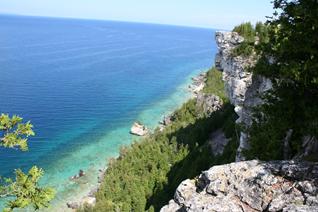Report to Parliament 2015 to 2016: Canada Water Act: chapter 2
I Comprehensive water resource management
The Canada Water Act (CWA) provides an enabling framework for collaboration among the federal, provincial and territorial governments in matters relating to water resources. Each level of government has different roles related to the management of water resources. Joint projects involve the regulation, apportionment, monitoring or surveying of water resources, and the planning and implementation of programs relating to the conservation, development and utilization of water resources. As well, there are many areas of shared responsibility.

Lion’s Head, Georgian Bay, ON
Photo: © Environment and Climate Change Canada
Canadian provinces, Yukon and Northwest Territories have responsibility over most areas of water management and protection. Most of these governments delegate some authority to municipalities, in particular drinking water treatment and distribution, and waste-water treatment operations in urban areas. In certain cases, local authorities responsible for a particular area or river basin take on some water resource management functions when requested by government.
The federal government has responsibility for managing water on federal lands (e.g., national parks), federal facilities (e.g., office buildings, laboratories, penitentiaries, military bases), First Nations reserves, and in Nunavut. The federal government also has jurisdiction to make laws in relation to fisheries, and navigation, both of which play a role in water management.
Agreements for specific water programs require participating governments to specify the amount of funding each will pay and the information and expertise they will provide, in agreed ratios. For ongoing activities such as the hydrometric monitoring agreements with each provincial and territorial government, cost-sharing is in accordance with each party’s need for the data. For study and planning agreements, generally the federal government and the specific provincial or territorial government each assume half of the costs. The planning studies encompass interprovincial, international or other water basins where federal interests are important. Implementation of planning recommendations also occurs on a federal, provincial/territorial and federal-provincial/territorial basis. Cost-sharing for infrastructure often includes a contribution from local governments.
The following Canada Water Act agreements were ongoing during 2015-2016.
Agreements related to apportionment and monitoring programs
- Renewed hydrometric agreements with nine provinces, Yukon and Northwest Territories, and with Aboriginal Affairs and Northern Development Canada for Nunavut
- Master Agreement on Apportionment in the Prairie Provinces (Prairie Provinces Water Board)
- Water quality monitoring agreements with British Columbia, Newfoundland and Labrador, New Brunswick, Manitoba, and Quebec
- Canada-Prince Edward Island Memorandum of Agreement on Water
- Agreement Respecting Ottawa River Basin Regulation
Arrangements and agreements related to water management intergovernmental cooperation or programs
- Mackenzie River Basin Transboundary Waters Master Agreement
- Canada-Manitoba Memorandum of Understanding Respecting Lake Winnipeg and the Lake Winnipeg Basin
- The Canada-Ontario Agreement on Great Lakes Water Quality and Ecosystem Health, which was made pursuant to the CWA.
Other agreement related to water quality:
- The Canada-Quebec Agreement on the St. Lawrence (2011-2026), which was made pursuant to the Department of the Environment Act and the Department of Fisheries and Oceans Act
The sections below describe federal, provincial and territorial collaboration in the following areas:
- data collection and use;
- inter-jurisdictional water boards; and
- partnership-based ecosystem approaches.